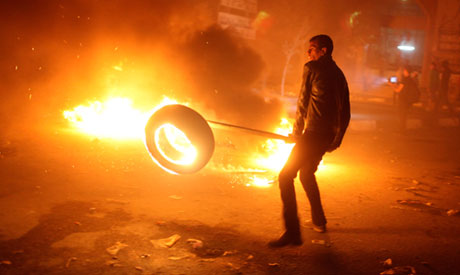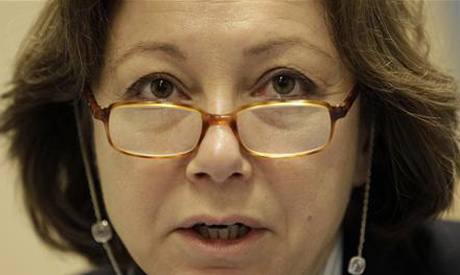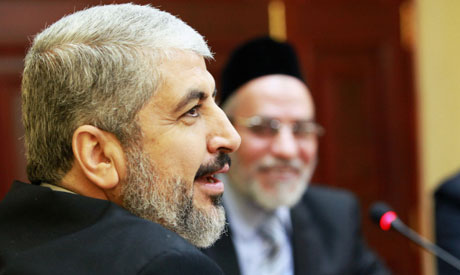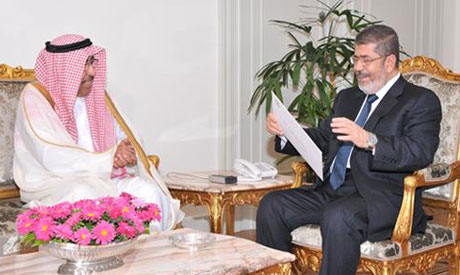CAIRO (AP) — Egyptian vigilantes beat two men accused of stealing a motorized rickshaw on Sunday and then hung them by their feet while some in a watching crowd chanted "kill them!" Both men died, security officials said.
The killings come a week after the attorney general's office encouraged civilians to arrest lawbreakers and hand them over to police. They are emblematic of the chaos sweeping Egypt and a security breakdown of frightening proportions.
It was one of the most extreme cases of vigilantism in two years of sharply deteriorating security following the 2011 uprising. Gruesome photos circulated quickly on Facebook and other social media outlets, showing images taken by people in the crowd of thousands who watched and recorded the lynchings on cell phone cameras.
The killings were in the town of Samanod, about 55 miles (90 kilometers) north of Cairo in the Nile Delta province of Gharbiya.
Mamdouh al-Muneer, spokesman for the Muslim Brotherhood group in the Gharbiya governorate, told The Associated Press that the lynchings followed a spate of rapes in the area. He said there have been a number of incidents in the past several months of girls being abducted while leaving school.
"Unfortunately, the police are completely out of the picture in Gharbiya. They are not comfortable with their position, with the president or with their role after the uprising," he said.
The Brotherhood is the country's dominant political group.
Egypt is currently mired in another wave of protests, clashes and unrest that have plagued the country since the ouster of authoritarian leader Hosni Mubarak in the pro-democracy uprising two years ago.
This wave of unrest has also engulfed the nation's police force. Thousands of officers and low-ranking policemen have broken ranks, staging protests and waging strikes against what they say is the politicization of the force by President Mohammed Morsi, who came from the Muslim Brotherhood, and his interior minister.
The state-run newspaper Ahram reported on its website that the events in Samanod began when the two men were dragged in the street after being caught "red-handed" trying to steal a motorized rickshaw. Witnesses said they were also accused of kidnapping a girl inside the rickshaw, but that she escaped unharmed.
A witness said they were beaten but still alive before they were strung up from the rafters of an open-air bus station. Both were stripped down to their underwear.
Photographs from the scene show one of the bodies hanging with deep, bloody lacerations covering his back. From the front, one of the men's face is completely covered in blood. Other shots showed both hanging by their feet, bruised, cut and bleeding.
A photographer who witnessed the scene told the AP that some in the crowd threatened to kill him if he took pictures of the lynchings with his professional camera.
He said that women and children were in the crowd of about 3,000 watching the lynchings, some from their balconies overlooking the scene, and some chanted in support "kill them!"
Afterward, residents took their bodies and dumped them on the doorstep of a nearby police station, according to witnesses.
Other photographs show the men lying on the ground dead in their underwear, with ropes around their feet.
Their bodies are covered in dirt, bruises, blood and lacerations as a group of men gathered around them. One man in the angry crowd grasped a knife in one fist and another held up a bloodied wooden stick.
Security officials said some in the crowd tried to help free the two men but were pushed back by others.
The bodies were later taken to the morgue for identification, according to security officials who spoke on condition of anonymity because they were not authorized to speak to the media.
Residents also threatened to lynch another two men accused of involvement in attacks on girls.
Witnesses said they were bracing for possible blood feuds between residents of Samanod, where the attack took place, and the nearby village of Mahallahit Ziyad, where the two men killed were from.
Ahram reported that police could not reach the site of the hangings because angry microbus drivers had cut off all the major roads of the nearby city of Mahalla to protest a shortage of diesel fuel, one of Egypt's many crises. Earlier in the day, residents there also burned tires and set up roadblock along a main train track to protest the fuel shortages.
"The lack of security has created a sense of terror here," one witness said, speaking on condition of anonymity for fear of reprisal. "The entire area is shut down because of protests against the fuel shortages."
Citizens have grown bolder in taking matters into their own hands following the 2011 uprising. The country's once powerful and feared police force was left weakened after the revolt.
Thousands of policemen are now on strike to demand better working conditions and they also refuse to confront widespread protests against President Morsi's leadership.
Some of the striking police officers allege that Morsi's Muslim Brotherhood is attempting to control them. The Brotherhood denies that.
Al-Muneer, the Brotherhood spokesman in Gharbiya, accused some policemen of hoping for a collapse of security to pave the way for the old regime to return to power. That same accusation has been leveled at the police repeatedly, both in the midst of the uprising and the aftermath.
He said the Brotherhood fully rejects the killings and said citizens should have arrested the two but then handed them over to police.
The attorney general's call for citizen arrests a week ago was prompted by the police strike and deteriorating security. Opponents of his call fear that this is a prelude to the substitution of police by militias, including those belonging to other Islamist groups allied with Morsi and the Islamic fundamentalist Brotherhood.
Interior Minister Mohammed Ibrahim, who oversees the country's police, met with officers and low-ranking policemen to hear their demands on Sunday.
Two days earlier, Morsi attended traditional Islamic prayers at a Cairo-based camp for riot police. He praised the force despite public criticism over their violent response to anti-government demonstrations.
Morsi is facing an onslaught of challenges, from the police strikes to an increasing number of violent sexual attacks on women to mounting diesel shortages that have crippled daily life for millions in Egypt.
And although vigilante killings are not frequent in Egypt, there have been similar attacks in the past two years.
In 2012 in northern Sharqiya province, police said relatives of a man who was killed when muggers tried to steal his car lynched one of the thieves. They then burned his body while it hung from a light pole.
Another case that year was in the Nile Delta province of Mansoura, where relatives of a victim took justice into their own hands and lynched two suspected killers.
Anger at Morsi was on display again Sunday, when protesters took their demands to the Brotherhood's doorstep. Hundreds clashed with police who fired tear gas at the crowd outside of the Islamist group's Cairo headquarters.
The crowd was responding to an assault on journalists, who claimed they were attacked by Brotherhood members Saturday evening during coverage of a meeting.
The journalists said that after a group of activists sprayed anti-Brotherhood graffiti on the ground outside the group's Cairo headquarters, the Brotherhood guards attacked with sticks and chains.
Brotherhood spokesman Mahmoud Ghozlan said in a statement that guards outside the building were provoked and insulted by the activists and journalists.
Many of the group's offices were attacked across the country in December during violent protests over the drafting of the constitution.
Dozens of journalists rallied outside their syndicate in the capital Cairo against the incident.
Diaa Rashwan, the newly elected head of the syndicate who replaced a figure considered by most journalists as pro-Brotherhood, said he would file a lawsuit against the Brotherhood spokesman for suggesting that journalists had incited the violence.
The opposition party Al-Dustor, led by Nobel laureate Mohamed ElBaradei, blamed the Brotherhood's leadership for allegedly encouraging "militias" loyal to the group to join the fight.
There were clashes on Saturday during protests against Morsi and the Brotherhood during the president's trip to the impoverished governorate of Sohag. The presidency on Sunday denied that opposition protesters had tried to storm the hall where Morsi had been speaking, despite video that showed the attempt.






